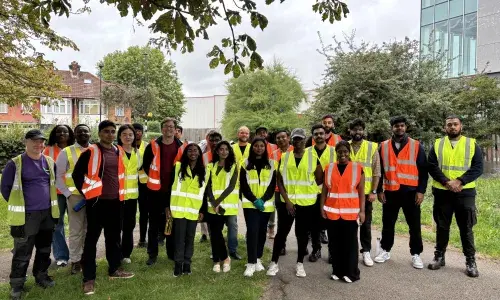
Powering the UK through a pandemic
As the world continues to get to grips with the impact of coronavirus, we’re working hard to make sure the lights stay on and the gas keeps flowing. Our UK Executive Director Nicola Shaw explains how.

As the owner and operator of the country’s national energy infrastructure, National Grid has a variety of roles to play to keep the energy flowing across Great Britain. Doing so during a global pandemic has presented our business with a fresh set of challenges.
During the lockdown, we have focused on our people, delivering energy for our customers and the nation, now and in the future, and our communities.
An immediate challenge has been the drop in demand for electricity (principally driven from industrial and retail shutdowns). So, the UK team has worked hard, together with other networks and market participants – such as power generators – to help the National Energy System Operator (NESO) prepare for voltage issues that could arise as a result of any imbalance between that lower demand and the supply of electricity.
Protecting our people
With a network of over 4,000 miles of overhead power lines, 1,400 miles of underground cable and 347 substations, it simply hasn’t been possible for all our colleagues to work from home. So, we’ve been doing everything we can to keep our people safe.
As part of this, we reviewed our risk assessments and ways of working to make sure that they were in line with the government’s guidance on social distancing – not just to keep our team safe, but also to ensure the safety of the communities where they’re working.
The changes to the ways of working have been critical to ensure that our staff feel safe and able to work away from their homes. The work we do in the field is varied, from:
- delivering voltage management actions to help balance demand and supply
- responding to third party issues, such as fires that could impact our infrastructure
- overhauling parts of the network that have reached the end of their useful life and need to be replaced to help ensure the network is fit for the future.
Support for our communities
As well as making sure we keep the power and gas flowing to the UK’s homes and hospitals, we’re proud to be playing our part in helping the most vulnerable in society.
We’ve made a £500,000 donation to the National Emergencies Trust and the Trussell Trust, which will allow them to get help to the many elderly, homeless and families living in poverty at this troubling time. We’re also encouraging our people to volunteer for half a day a week to support their local communities.
And we’ve supported the University Hospitals Birmingham Charity with the launch of a £1m appeal, to raise funds for patients and staff at five hospitals local to our National Grid Ventures base in Solihull; giving £100,000 to pay for tablet computers that will allow patients to connect with their loved ones while in hospital isolation.
Delivering on future needs
I’m pleased to say that, despite the uncertainty that coronavirus presents, we’re also continuing to deliver key projects up and down the country. Examples of this are the London Power Tunnels 2 project – the second part of essential work to replace London’s aging electricity infrastructure – and the North Sea Link interconnector, where work has started to lay down the cable that will connect the electricity transmission systems between the UK and Norway.
There isn’t a single date to which we can plan for a return to old ways of working. Instead we’ll continue to evolve our approach as government guidance changes. No matter what, our focus remains on keeping the energy flowing, ensuring our people are safe, supporting our communities and delivering what the system needs for the longer term.


